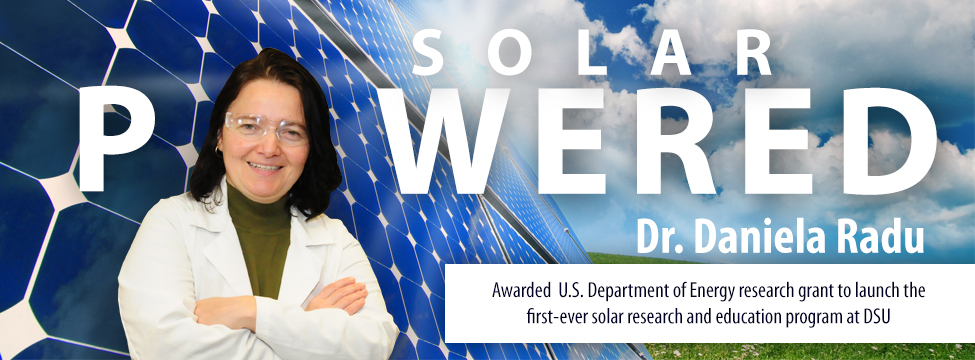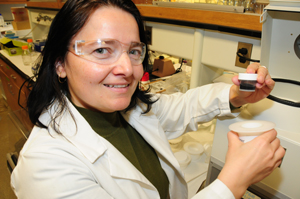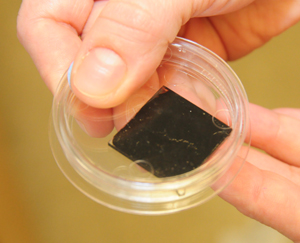
Archive
DSU Chemistry Dept. Receives $326,138 Federal Research Grant
Wednesday, October 23, 2013
10/23/13
Delaware State University has been awarded a grant that is further expanding the University’s research portfolio into the area of solar energy.
|
|
DSU’s Department of Chemistry has been awarded a U.S. Department of Energy $326,139 research grant to launch the first-ever solar research and education program at DSU. The principal investigator of the grant is Dr. Daniela Radu, assistant professor of chemistry.
The proposal received tremendous support both internally at DSU and externally by U.S. Sen. Chris Coons and the Delaware Sustainable Chemistry Alliance (DESCA), an organization that has the strongest impact in Delaware's renewable energy from sustainable resources.
The grant will fund the establishment of a new solar classroom course, as well as initiate a solar research program that will begin with the development of a novel ultra-thin-film photovoltaic technology using iron-based solution and nano-precursor absorber layers in solar devices.
The solar-related course will prepare participating students toward considering employment in industrial and research-related solar applications. Two graduate students assigned to this project will be fully prepared to obtain employment in the solar-energy arena.
The research will involve the fabrication of sustainable ultra-thin iron-based material for high-efficiency solar devices. Sustainable, low-cost materials such as iron sulfide derivatives could address environmental and economic concerns raised by other thin film materials. Iron-based materials are believed to be a viable alternative due to their sustainable nature and small amount of material involved in the devices.
|
|
Dr. Radu said that solar energy represents a major pillar of sustainable energy production and as solar power becomes more cost-effective, it has the potential to fulfill a larger share of growing U.S. energy needs.
“The expansion in solar energy usage will drive a growing need for more workers – manufacturing workers to make solar panels, construction workers to build power plants, solar photovoltaic installers to install solar panels, and more,” Dr. Radu said. “In this context, providing solar-related education to students from underrepresented groups is aligned with this job opportunities growth and with the need of having a diversified workforce in solar-related jobs.”
Dr. Noureddine Melikechi, dean of the College of Mathematics, Natural Sciences and Technology and vice president of research, innovation and economic development, said the grant award demonstrates clearly that the Department of Chemistry and DSU’s newly formed Renewable Energy Research and Education Center – an interdisciplinary center that combines faculty from the departments of Physics and Engineering and Chemistry – are on the right track.
“Dr. Radu has done a tremendous job in securing this grant in a very competitive environment,” Dr. Melikechi said. “Our plan to achieve national prominence in research and education in renewable energy is now effectively launched.”
Dr. Eric Kmiec, chair of the DSU Department of Chemistry, said Dr. Radu’s grant writing success is to be commended.
“This grant is at the top of grant hierarchy and reflects the new momentum and attitude in the department. DOE has made just two awards in this competition and DSU is the only HBCU that has been selected for an award; University of Texas at San Antonio being the other awardee,” Dr. Kmiec said. “These types of awards provide solid support for undergraduate and graduate students seeking to do research in credible lab settings.”
Dr. Kmiec added that the grant project is consistent with the department’s new scientific emphasis on sustainable chemistry, which is aligned with the University Provost’s sustainability initiative and the public/private partnership with the Delaware Sustainable Chemical Alliance. “The academic and research fruits of this grant will contribute to the expected robust expansion of that emphasis and alliance,” he said.
Rebecca Fox-Lykens, the director of DSU’s Center for Teaching and Learning, has assisted Dr. Radu in the development of the solar course, and notes that the work the grant is funding is consistent with the University’s Strategic Plan.
“The grant will allow DSU to be innovative in its approach to explore alternative energy sources and the course Dr. Radu is developing will help students become aware of the opportunities in green jobs,” Dr. Fox-Lykens said.
Dr. Radu noted that the University of Delaware also played a role in helping the University launch this research.
“As we are moving toward building the necessary infrastructure, Dr. Robert Birkmire, director of UD’s Institute of Energy Conversion, along with his colleague, Dr. Kevin Dobson, has graciously made it possible for DSU to access some equipment and characterization tools at UD that are needed to achieve our prototype,” Dr. Radu said.


 Dr. Daniela Radu, principal investigator of the Department of Energy research grant, show the nanoparticle ink used to coat the solar cell substrates that is being developed.
Dr. Daniela Radu, principal investigator of the Department of Energy research grant, show the nanoparticle ink used to coat the solar cell substrates that is being developed. The solar cell substrate being developed by Dr. Radu.
The solar cell substrate being developed by Dr. Radu.